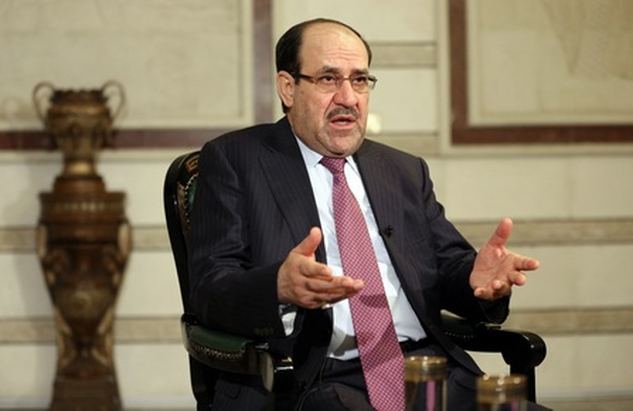As one of the country’s three vice presidents, he now holds a largely ceremonial position in the government of his successor, Haider al-Abadi.
But whether Maliki has given up his quest for power is increasingly in question as he sets about widely publicized battlefield tours, meetings with tribal elders and visits abroad.
[Maliki steps aside, easing Iraq’s political crisis]
In an interview at his villa, he denied any desire to reclaim his former position and pledged support for Abadi, who six months into the job is attempting to quell the chaos convulsing Iraq. Maliki has been widely blamed for much of it, with policies largely seen as sectarian.
“Based on my popular support base, which still exists and is strong, it’s possible,” he said, indicating that he is setting his sights on Iraq’s next election, due in 2018.
“Legally and constitutionally, it’s possible,” he said. “But it’s the Iraqi people’s choice.”
Maliki’s looming presence poses a challenge for Abadi as the premier attempts to win back ground from Islamic State extremists and repair rifts with Iraq’s Sunnis and Kurds. Maliki’s reemergence comes as an offensive to retake the city of Tikrit has highlighted Abadi’s lack of control over the Shiite volunteers and militias that led the fight.
“We haven’t seen the end of Maliki,” said Mowaffak al-Rubaie, a lawmaker from the former prime minister’s State of Law bloc.
A Western diplomat based in the region said there are deep concerns about what Maliki may be up to and little doubt that he is trying to undermine Abadi. Maliki appears to wield influence over more members of parliament than Abadi and seems to have more support in the security institutions, the diplomat said.
On a March trip to a town near Tikrit where fighters had driven out Islamic State militants, Maliki greeted the forces as if he were still in power.
Since leaving office, he has become a particular champion of the legions of largely Shiite volunteers and militias known as the “popular mobilization units” — many of which answered a call from Iraq’s most senior Shiite cleric to fight.
“I established it in my time,” Maliki said of the force that was mustered in the dying days of his leadership. “And they feel very close to me, or may be loyal to me. Therefore, I keep working with them and supporting them and pushing them to fight.”
Contrasting styles
Not everyone believes that Maliki can make a comeback.
“He had a big failure in administering the country,” said Izzat Shahbandar, a former lawmaker from the State of Law coalition, who remains friends with Maliki. “There is no Iraqi power, Sunni, Shia or anyone else, who will support him."
But Maliki clearly has support in his party, Dawa. Maliki is senior to Abadi in the party, holding the title of secretary general. Some Dawa members mockingly refer to Abadi as “the traffic warden,” suggesting that although he runs the government, his actual power is in question.
Maliki and Abadi have drastically different ruling styles, perhaps rooted in their disparate experiences of exile during the rule of Saddam Hussein. While Abadi, an English speaker who worked as an electrical engineer in Britain, is seen as cozy with the West, Maliki, whose U.S. backing fell away in the final years of his rule, is closer to Iran, where he lived for seven years.
[Meet Haider al-Abadi, the man named Iraq’s new prime minister]
On billboards around Baghdad, Maliki’s pictures still loom large. Abadi, in contrast, has ordered that no posters of him be displayed.
When Maliki ventures from the Green Zone, he does so in a big convoy of armored SUVs. Abadi won plaudits for publicly visiting a shrine in Baghdad accompanied by only two bodyguards.
The rivalry between Maliki and Abadi is thinly veiled.
“What he’s doing is what’s possible — not the ambition that is required, but what’s possible,” Maliki said pointedly of Abadi’s progress. He added, though, that his successor is constrained by the country’s shaky finances and fragile security.
Maliki is quick to point out what he sees as flaws in Abadi’s policies. For example, he criticized Abadi’s proposal for a national guard, a new system of localized forces that would be a cornerstone of the country’s security policy. “I’m the one who suggested it, but not in the way it has developed recently. It’s become a danger to national unity,” Maliki said.
The competition has sparked rumors of splits within the Dawa party.
“There are people close to Nouri al-Maliki who are trying to make some problems, talking against Haider al-Abadi,” concedes Ali Alaq, a senior Dawa member, though he dismissed the notion of a rift. “Nouri al-Maliki says he has nothing to do with them.”
In his home in the upscale Baghdad neighborhood of Mansour, Maliki ally Saad al-Muttalibi is less than flattering about the new leader, though he claims that Abadi is an old friend.
“I don’t know if he’s trying to show himself as a technocrat, or if it’s just inability,” said Muttalibi, a member of the Baghdad provincial council. Members of parliament are rallying to support Maliki, he said.
Maliki, known for his unrelenting work ethic, has kept up a hectic schedule since leaving power.
When Abadi made his first visit to Iran last year, Maliki followed a few weeks later, also meeting with the supreme leader, Ayatollah Ali Khamenei.
Read More


 RSS Feed
RSS Feed